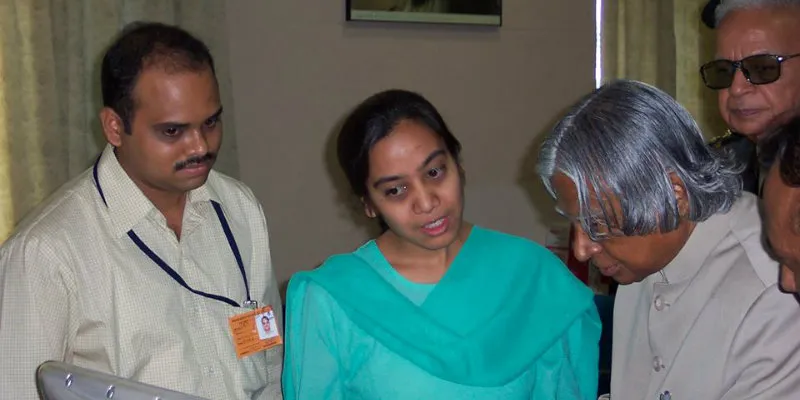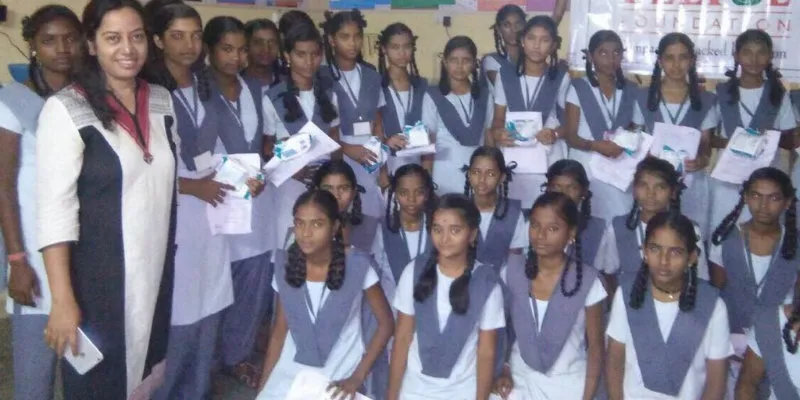Geeta Bora is on a mission to question menstruation taboos
The founder of Pune-based Spherule Foundation spearheads a social initiative that, among others, conducts awareness programmes on menstrual hygiene across the country.

Geeta Bora’s story, in a way, mirrors that of Mohan Bhargava, Shah Rukh Khan’s character in the film Swades. In reel life, Mohan leaves a cosy life in the US to make an impact in a small village in India.
India has spawned many Mohan Bhargavas, and Geeta Bora’s story is an inspiration from real life.
In November 2016, Geeta was working in the US as a software architect when she decided to take a long vacation. That particular visit to India became a turning point in her life, and helped her make a difference to not only her life but that of others’ as well.
“I heard about an incident in Shikoabad, a small village in Uttar Pradesh where a 42-year-old woman died because she used a blouse as a sanitary napkin. She died of tetanus when the metal hook of the blouse entered her body. The incident shocked me and thought I should come back to India and do something in this direction,” she recalls.
And just like that, Geeta left her job to come back to India and started the Spherule Foundation in Pune, a social initiative that among others, conducts awareness programmes on menstrual hygiene in schools, colleges, orphanages, slums, villages, and communities across the country.
From software to social change
Geeta’s life and career had followed the conventional path until this decision. After completing her Masters in Computer Science, she joined ETH (Education to Home) Research Lab, and worked with Vijay Bhatkar, known as the architect of supercomputing in India, who spearheaded the development of Param supercomputers.

“In 2002, we created a software system with which we could take education to remote and poor students through virtual sessions over a desktop webcam. The then President of India APJ Abdul Kalam visited us, and guided us further. I will always remember what he told me, that real contentment is not in success or wealth, you can get it by giving and helping others,” she says.
After spending nine years in the US, she returned to India with ‘social change’ on her mind. “Women and children are often the most oppressed, and their needs and rights must be central to eliminating it. We are currently focusing more on issues related to them and outlining our social initiatives accordingly,” says Geeta.
Tacking a taboo topic
Consider this alarming statistic - In India only 12 percent of India’s 355 million menstruating women use sanitary napkins and the remaining 88 percent cannot afford sanitary napkins and instead use unhygienic substances such as newspaper, sand, leaves, mud or unsterilised cloth or rags.
Such unhygienic practices lead to itching, burning, vaginal infections, infertility and other reproductive health complications.
According to Geeta, menstruation is a topic nobody really talks about. “People keep whispering about it, but we are making every attempt to say it loud to the point where it’s not awkward. Many of them know the benefits of using sanitary napkins but it’s just that they cannot afford it,” she adds.

To this end, the Spherule Foundation began distribution of the 'Stri' sanitary napkin, at par with leading brands when it came to quality, but low in cost, only Rs 300 for an entire year’s supply. It also hopes to build its own factory in the near future.
“I used to meet many families who earlier used to consider menstruation as an unclean act. They didn’t want their girls and women to discuss menstrual hygiene in public. But now, I can see lot of improvement in their perspective.
Even schools are coming forward to invite us to take sessions for the girl students. The biggest difference that I am noticing is many women, after these sessions, have started using sanitary napkins and are also comfortable in their experiences.”
Education should not be restricted only to girls, she feels. “We cannot afford to have another generation of boys and men who are misinformed about menstruation. I have taken sessions in prestigious schools and found boys laughing or joking on this topic. Who prepares these boys on how to react when a girl accidentally stains her dress or uniform? There is something we need to correct in our parenting and teaching too.”
Aiming for the moon
The Foundation is also crowdfunding to create a fully-coloured, illustrated, educational yet entertaining comic book ‘MoonTime’ for girls.
“Comics visually display narration and create more impact on young minds, and remain etched in one's memory for a longer time. So, we came up with a creative idea of writing a children and a teenage-friendly book that will make young girls aware of all the facts relating to periods. Menstruation is also known as Moontime in Native American culture, and so we felt it is the most positive word for menstruation, as it represents the power of birth and power of life. It is an attempt to break the cycle of myths and misconceptions related to menstruation,” says Geeta.
Consistent and constant awareness
Awareness needs to be continuous and consistent for far-reaching impact. When asked if a film like Padman (based on the life of social entrepreneur Arunachalam Murugunantham who developed low-cost napkins, and to be released on February 9) could help in changing perceptions, Geeta says:
“Cinema can play a crucial role in changing the society's common perception about sensitive social issues. It's good but by just making a single film we cannot get rid of misconceptions, it's a continuous process and we will have to work together for it.”
Awareness about menstruation remains on top of the agenda at Spherule Foundation. “We dream of a future where menstruation is not taboo, but a welcome transition into womanhood for girls where they refuse to be treated as less capable, weaker, dirty or impure. It's high time we speak openly about menstruation in India, we truly need to quash the taboos one at a time,” she says, signing off.







